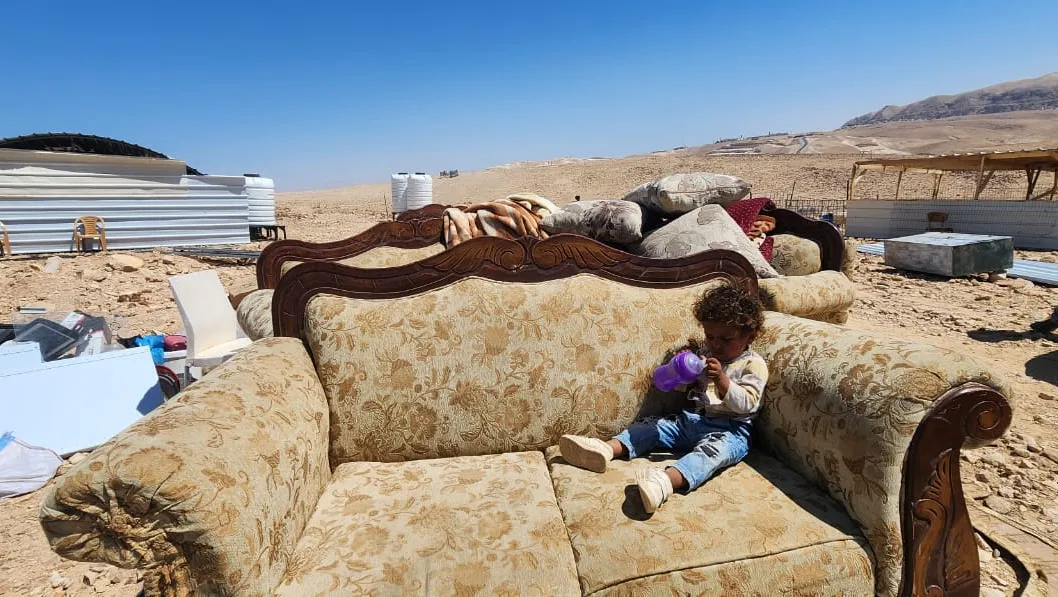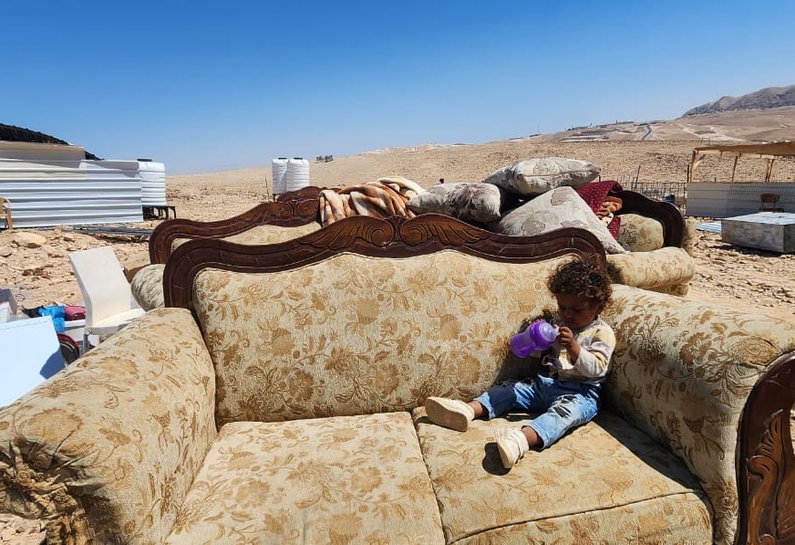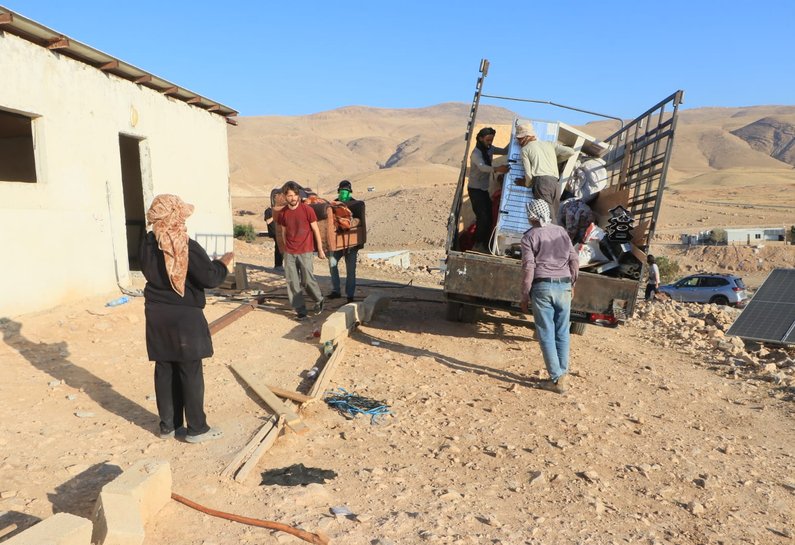“The settlers’ goal is to erase our presence completely”: Escalating settler violence displaces community in the Jordan Valley
16 July 2025


In the days leading up to the forced displacement, Israeli settlers erected a new outpost – an illegal and unauthorised settlement – close to the community’s school, stole dozens of sheep, and looted and seized yet another home – the fourth to be taken by settlers in the past weeks. The establishment of the new outpost inside the community left families fearing for their lives, their children, and their livelihoods. Remaining was no longer an option.
Rama* a resident of the community, described the violence as a severe escalation: “For years, settlers have harassed us... But what happened yesterday [with the establishment of the outpost] was a dangerous turning point.”
She recalled to MAP, “On Thursday night, no one slept. Everyone was trying to gather their belongings to leave. People were heartbroken over their area, over their homes they had to demolish with their own hands. By Friday morning, everyone was packing up their homes and began to leave. Even as we were being displaced, settlers kept attacking – trying to steal our livestock.”
Another resident, Khaled*, told MAP: “We live under constant threat. The settlers’ goal is to erase our presence completely.”
In Al-Muarajat, like other areas across the West Bank, settlers are doing what the Israeli authorities and forces have long enabled and supported: pushing Palestinians off their land. Between 1 January 2024 and 31 May 2025, 1,038 Palestinians were displaced due to settler violence and access restrictions, including from the Jordan Valley – a strategic area where Israel’s annexation efforts are accelerating.
Al-Muarajat is now the ninth community to be forcibly displaced in the area between the Ramallah and Jericho governorates – along Roads 457, 458 (Allon Road), and 449 (Al-Muarajat Road) – in just the past two and a half years, following recurrent and escalating settler violence. Several other communities are also at imminent risk of being forcibly displaced.
On Friday, Rama’s family was displaced from Al-Muarajat to an area near Aqabat Jaber; only to find another nearby outpost. After days under the sun without shelter, Israeli forces raided them, questioning the family about their water source and the location of their sheep. Settlers raided them as well, and when the family asked the soldiers to intervene, they were silenced. The soldiers threatened them: leave the area by 8pm, or lose everything.

“For me, I’ve been displaced twice – twice – and am still without a home,” Rama told MAP. “Even though our home was simple, we were comfortable and lived with dignity. I have my master’s classes starting in a month, and my sister is in her final year of high school, and she has her exams. She can't study properly – she's trying to study for her exams under the sun.”
Afterwards, Rama’s family joined others in Al-Awsaj, where the majority of the displaced community had sought refuge. There is no electricity and no water. When some attempted to return to Al-Muarajat, they were attacked and fired upon by settlers.
Al-Muarajat East is located in Area C, the 60% of the West Bank that is under full Israeli military and civil control. Discriminatory policies imposed by the Israeli authorities mean that Palestinians living in Area C are denied access to permanent healthcare facilities. To ensure that these systematically underserved communities do have access to healthcare, MAP provides mobile clinics in these areas.
When MAP’s mobile clinic was visiting Al-Muarajat on Thursday 3 July, team members recognised the settlers raiding the community – they had harassed and questioned the clinic staff during previous visits.
“The residents were visibly shaken,” said MAP’s Mental Health and Psychosocial Support (MHPSS) Specialist. “I was speaking with one young man when he suddenly froze and pointed; a settler vehicle was approaching. Within seconds, everyone standing outside rushed into their homes and locked themselves inside. This is not a rare reaction, this is daily life for them.”
The psychosocial toll of this ongoing settler violence and fear is devastating. Children and young people are especially affected. MAP’s mobile clinic team has witnessed a sharp rise in children experiencing stress-related symptoms, including nightmares, bedwetting, and extreme fear of strangers – even when those strangers are Palestinian aid workers.
“Living in this kind of constant fear keeps people in a permanent state of survival,” MAP’s MHPSS Specialist explained. “These children haven’t been able to process that trauma, because the threat has not ended. Settlers can return at any moment. There is no “post-trauma” when the violence never stops. It remains an ongoing trauma.”
Across the West Bank, settler violence causing casualties or property damage has surged in recent years, with incidents rising from 532 in 2021 to 1,449 in 2024 – and some 740 attacks already in just the first half of 2025. Last month marked the highest monthly number of Palestinians injured by Israeli settlers in the past two decades. Just two weeks ago, on 25 June, three Palestinians were killed by Israeli forces after dozens of settlers attacked a Palestinian village near Ramallah, with reports indicating that the Israeli military blocked ambulance access, delaying medical assistance for the injured.
Backed by the Israeli military and chronic impunity, these settler attacks aim to forcibly displace Palestinians, undermine their presence and entrench permanent control over the land. Such attacks must be understood as what they are: a deliberate component of Israel’s broader annexation efforts in the West Bank.
The forced displacement of Al-Muarajat community underscores the urgent need for concrete and immediate action. While targeted sanctions against Israeli settlers and ministers – as was recently implemented by the UK – are welcome steps, they are not enough. One of the sanctioned settlers, Zohar Sabah, was directly involved in establishing the new outpost near Al-Muarajat’s school, underscoring how settler-led, state-backed dispossession continues. Moreover, focusing on individuals fails to address the systemic nature of settlement expansion and annexation, which is carried out as a matter of state policy.
MAP urges the UK Government and the wider international community to go further. The UK must redouble its efforts to ensure the immediate return of the Al-Muarajat community to their land, the dismantlement of the outpost, and to protect other Palestinian communities at risk. The UK must also take immediate steps to respond to the July 2024 Advisory Opinion of the International Court of Justice, which found that Israel’s continued occupation, settlement enterprise, and annexation of Palestinian land are illegal under international law.
This moment demands more than condemnation. It demands accountability.
The UK and international community must take decisive action to end Israel’s illegal occupation, the settlement project, racial segregation and apartheid. Without real consequences, the erasure of communities like Al-Muarajat will continue – in full view of the world.
*Names have been changed to protect the identities of those involved.
Photo: A two-year-old child who was forcibly displaced from Al-Muarajat community. (Credit: Aref Daraghmeh).